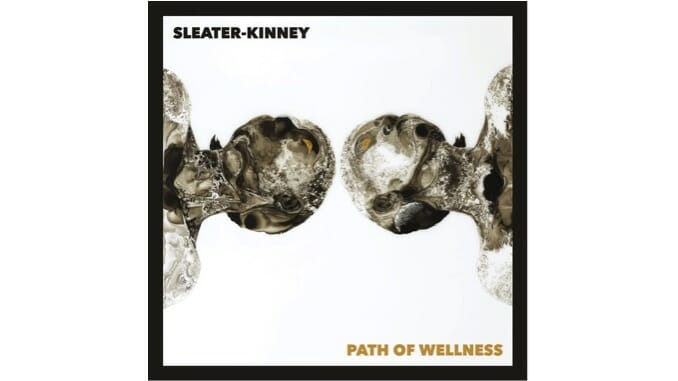Sleater-Kinney Reinvent Themselves as a Duo on Path of Wellness
Carrie Brownstein and Corin Tucker reckon with protests, pandemic dread and '70s rock influences on their 10th album

There’s no “loud-quiet-loud” in Sleater-Kinney’s world. Usually, there’s no “quiet,” period. As Carrie Brownstein wrote in her 2015 memoir, “I can listen to soft songs, but I can’t play them. Even Sleater-Kinney’s lighter songs feel thorny or brittle—they aren’t gentle, and they make horrible background music.”
Path of Wellness, the Northwest band’s 10th album (and yeah, let’s get this out of the way, their first as a duo), doesn’t end this tradition exactly. There are no power ballads, no string codas. But Path—even more than 2019’s polarizing The Center Won’t Hold—does present a gentler, groovier Sleater-Kinney, and this one kicks off with the breeziest music of the band’s 25-year career. The title track doesn’t roar to life à la “Dig Me Out” or “The Fox” so much as it stutters and clangs with a clattering, polyrhythmic groove, which becomes the backbeat for Corin Tucker’s double-tracked pleas: “Drain me of my toxins / Drain me of the life I lead,” she sings. Later comes the coy refrain: “I’m on a path of wellness.”
It’s the first hint that Path of Wellness is an album rooted in a yearning for love and stability during wildly unstable times—and that the two remaining members of Sleater-Kinney are not aiming to replicate the sound they had with ex-drummer Janet Weiss, whose 2019 departure cast a heavy shadow over the new record. Path of Wellness is not quite a consistently triumphant reinvention, but it’s far from the dud some Weiss loyalists anticipated. What results is a very good, occasionally uneven effort that finds Tucker and Brownstein dabbling in sugary pop, ’70s rock sleaze, and even some R&B swagger while replacing Weiss with a handful of Portland-area musicians.
For Tucker and Brownstein, the recording process provided a respite last summer as their home city of Portland was shaken by violent clashes between protesters and police, devastating wildfires and of course the unending pandemic. At times, there’s a curious disconnect between the music—breezy riffs that were written pre-pandemic and intended for an outdoor summer tour in 2020—and the lyrics, which, as Tucker put it, “got finished when things were like, ‘Oh, no! You’re definitely not going on tour.’”
-

-

-

-

-

-

-

-

-

-

-

-

-

-

-

-

-

-

-

-

-

-

-

-

-

-

-

-

-

-

-

-

-

-

-

-

-

-

-

-








































